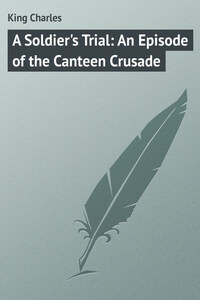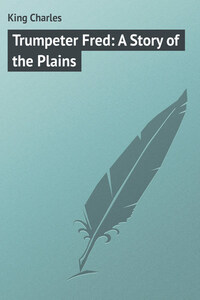CHAPTER I
TWO ANNOUNCEMENTS
The war with Spain was at an end, and so were the hopes and aspirations of many a warrior. For several reasons Colonel Ray of the – th Kentucky was a disappointed man. One of the best soldiers doing duty with the volunteers, he had had some of the worst luck. Through long years of service in the regular cavalry he had borne the reputation of being a most energetic and valuable officer. He had won a name as an Indian fighter the Indians themselves respected. He had campaigned all over the frontier before the railways came and conquered. He knew Arizona and New Mexico even better than his native State, and was known from the upper Missouri to the lower Colorado far more generally than in the "blue grass" country of his boy days. Apache and Arapahoe, Comanche and Cheyenne, Sioux and Shoshone, they all had met, and many had measured spear with, the dark-eyed, curly-headed Kentucky light-horseman. He bore the scars of more than one sharp encounter; had given more than he had received, yet found himself in no wise blessed with profit or promotion. The Civil War was fairly ended when he stepped from the Point into his first commission. Over thirty years had he done valiant and faithful duty in the line, yet was he only just wearing the gold leaves as junior major of his regiment, when the long-expected happened in the spring of '98, and the nation called out its first levy of volunteers. Slow as had been his advancement, it was phenomenally swift as compared with that of classmates who, choosing the artillery arm, had languished those thirty years in the line of file closers. Ray had no complaint to make. He was even rejoiceful in his luck when called to Kentucky to command one of her regiments of volunteer infantry. He was, indeed, among the few envied men in the army where so very few have anything to excite the cupidity of their kind. His record and reputation were things no man could undermine, though some might underestimate. His temperament was sweet and sunny. He had long been happily, most happily, married. His wife was charming, admired, and beloved. His children were all a father's heart could wish. Health and competence had always been theirs. They had, indeed, for years known the joys of moderate wealth, for Mrs. Ray had brought her husband something besides beauty and grace, physical and spiritual. The Marion Sanford of the Centennial year of '76 was reputed an heiress, and the children that had come in course of time to bless their union were certainly born to the purple. But army people of those days lived long years in the far West, had to trust their business affairs to agents in the far East, and some agents could not stand such prosperity. Mrs. Ray's property was mainly in real estate, some of which became gradually unproductive. Then there came the financial storm of '93, and a subsequent flitting of financial agents, some to the convenient Canadas, some to the Spanish Main.
Then another thing happened, almost whimsical in the way of retributive justice where Mrs. Ray's relatives were concerned. That the resultant burden should have been saddled on her cavalry husband was perhaps not quite so diverting. There were several of Mrs. Ray's nearest of kin who had by no means approved of her marriage in the army, and to a nameless, moneyless subaltern at that. "He will make ducks and drakes of her fortune," said they. "He will drink and gamble it away," said certain others. Ray had possibly heard, had probably expected this. At all events he had steadfastly declined to use his wife's money. He had gone so far as to grieve her not a little by very gently, but very firmly, declining to undertake the management of her property. That was all left in the hands of her people. It was the agent of their choice who made ducks and drakes of much of it, as well as of their own, and, at the time the Spanish War broke out, from his pay as major in the line of the army "Billy" Ray was contributing to the support of certain of the children of his former detractors.
Then came partial relief. "Sandy" Ray, their eldest son, commissioned like his father in the cavalry, was no longer to be provided for. Indeed, he was sending every month a certain quarter of his salary direct to his mother to repay her for moneys advanced for him when they were much needed. Maidie Ray, their lovely dark-eyed daughter, had married the man of her choice, a well-to-do young New Yorker of most excellent family. There was only Billy, Junior, among their olive branches now to be provided for until he could look out for himself. There was even prospect of his being sent to West Point within the year to make a try at that which had proved too hard a problem for his unmathematical elder brother, for Sandy had worn cadet gray long enough to get much of the practical teaching of our famous school, though he could not assimilate the requisite amount of the theoretical. It was the year after the surrender of Santiago and the muster out of most of the State volunteers that, in the goodness of his heart, Colonel Ray turned to Marion, his wife, and said:














